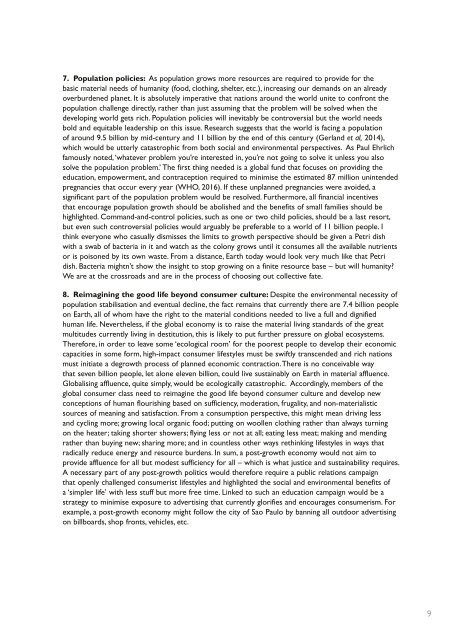peerreviewed Fellow
MSSI-IssuesPaper-6_Alexander_2016
MSSI-IssuesPaper-6_Alexander_2016
Create successful ePaper yourself
Turn your PDF publications into a flip-book with our unique Google optimized e-Paper software.
7. Population policies: As population grows more resources are required to provide for the<br />
basic material needs of humanity (food, clothing, shelter, etc.), increasing our demands on an already<br />
overburdened planet. It is absolutely imperative that nations around the world unite to confront the<br />
population challenge directly, rather than just assuming that the problem will be solved when the<br />
developing world gets rich. Population policies will inevitably be controversial but the world needs<br />
bold and equitable leadership on this issue. Research suggests that the world is facing a population<br />
of around 9.5 billion by mid-century and 11 billion by the end of this century (Gerland et al, 2014),<br />
which would be utterly catastrophic from both social and environmental perspectives. As Paul Ehrlich<br />
famously noted, ‘whatever problem you’re interested in, you’re not going to solve it unless you also<br />
solve the population problem.’ The first thing needed is a global fund that focuses on providing the<br />
education, empowerment, and contraception required to minimise the estimated 87 million unintended<br />
pregnancies that occur every year (WHO, 2016). If these unplanned pregnancies were avoided, a<br />
significant part of the population problem would be resolved. Furthermore, all financial incentives<br />
that encourage population growth should be abolished and the benefits of small families should be<br />
highlighted. Command-and-control policies, such as one or two child policies, should be a last resort,<br />
but even such controversial policies would arguably be preferable to a world of 11 billion people. I<br />
think everyone who casually dismisses the limits to growth perspective should be given a Petri dish<br />
with a swab of bacteria in it and watch as the colony grows until it consumes all the available nutrients<br />
or is poisoned by its own waste. From a distance, Earth today would look very much like that Petri<br />
dish. Bacteria mightn’t show the insight to stop growing on a finite resource base – but will humanity?<br />
We are at the crossroads and are in the process of choosing out collective fate.<br />
8. Reimagining the good life beyond consumer culture: Despite the environmental necessity of<br />
population stabilisation and eventual decline, the fact remains that currently there are 7.4 billion people<br />
on Earth, all of whom have the right to the material conditions needed to live a full and dignified<br />
human life. Nevertheless, if the global economy is to raise the material living standards of the great<br />
multitudes currently living in destitution, this is likely to put further pressure on global ecosystems.<br />
Therefore, in order to leave some ‘ecological room’ for the poorest people to develop their economic<br />
capacities in some form, high-impact consumer lifestyles must be swiftly transcended and rich nations<br />
must initiate a degrowth process of planned economic contraction. There is no conceivable way<br />
that seven billion people, let alone eleven billion, could live sustainably on Earth in material affluence.<br />
Globalising affluence, quite simply, would be ecologically catastrophic. Accordingly, members of the<br />
global consumer class need to reimagine the good life beyond consumer culture and develop new<br />
conceptions of human flourishing based on sufficiency, moderation, frugality, and non-materialistic<br />
sources of meaning and satisfaction. From a consumption perspective, this might mean driving less<br />
and cycling more; growing local organic food; putting on woollen clothing rather than always turning<br />
on the heater; taking shorter showers; flying less or not at all; eating less meat; making and mending<br />
rather than buying new; sharing more; and in countless other ways rethinking lifestyles in ways that<br />
radically reduce energy and resource burdens. In sum, a post-growth economy would not aim to<br />
provide affluence for all but modest sufficiency for all – which is what justice and sustainability requires.<br />
A necessary part of any post-growth politics would therefore require a public relations campaign<br />
that openly challenged consumerist lifestyles and highlighted the social and environmental benefits of<br />
a ‘simpler life’ with less stuff but more free time. Linked to such an education campaign would be a<br />
strategy to minimise exposure to advertising that currently glorifies and encourages consumerism. For<br />
example, a post-growth economy might follow the city of Sao Paulo by banning all outdoor advertising<br />
on billboards, shop fronts, vehicles, etc.<br />
9


